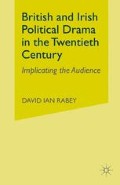Abstract
Whilst Brecht strove towards the objective of a ‘rational theatre’ or at least one which pushed the audience towards the formulations of logical connections between social structure and individual misery, the dramatists of the Fifties, Osborne, Wesker and Behan, also made considerable impact by turning their dramatic focus onto society. However, the latter playwrights’ outrage was unashamedly informed by emotional objections to the loss of self, identity and integrity enforced by society, rather than by reference to political ideologies exposing economic and judicial inequality inherent in the social status quo. Without wishing to denigrate their startling effect upon the direction of theatre, Wesker, Behan and particularly Osborne have more in common with their dramatic predecessors than with their successors; their effectiveness frequently lay in the rediscovery and sharpening of techniques and themes familiar from Shaw, O’Casey and the naturalists. Osborne’s plays continue to be an internal guide through a modern Heartbreak House, but its lethargy is challenged by the vociferously protesting but primarily intuitive voices of its more intelligent sufferers — who nevertheless fail to escape from their tragic solitude.
I attract hostility. I seem to be on heat for it. Whenever I step out onto those boards — immediately, from the very moment I show my face — I know I’ve got to fight almost every one of those people in the auditorium. Right from the stalls to the gallery, to the Vestal Virgins in the boxes! My God, it’s a gladiatorial combat! Me against them! Me and mighty Them! Oh, I may win some of them over. Sometimes it’s a half maybe, sometimes a third, sometimes it’s not even a quarter. But I do beat them down. I beat them down! And even in the hatred of the majority, there’s a kind of triumph because I know that, although they’d never admit it, they secretly respect me.
Epitaph for George Dillon 1
Access this chapter
Tax calculation will be finalised at checkout
Purchases are for personal use only
Preview
Unable to display preview. Download preview PDF.
Notes
John Osborne and Anthony Creighton, Epitaph for George Dillon (1958) pp. 56–7.
Alan Carter, John Osborne (1974) p. 191.
John Osborne, T.V. Times, vol. 102, no. 10 (1981) p. 3.
John Osborne, Look Back in Anger (1957) p. 19.
Robert Wilcher, ‘The Fool and his Techniques in the Contemporary Theatre’, Theatre Research International, IV, no. 2 (February 1979) pp. 117–33 (123).
John Osborne, The Entertainer (1957) p. 71.
John Osborne, A Subject of Scandal and Concern (1961) pp. 46–7.
John Osborne, Time Present and The Hotel in Amsterdam (1968) p. 39.
John Osborne, A Sense of Detachment (1973) p. 24.
Jean-Paul Sartre, What is Literature? (1950) p. 61.
Arnold Wesker, The Wesker Trilogy (1964) pp. 29–30.
Arnold Wesker, Three Plays (1976) p. 203.
Arnold Wesker, Play Volume Three (1980) p. 106.
Arnold Wesker, Plays Volume Four (1980) pp. 178–9.
Brendan Behan, The Complete Plays (1978) p. 206.
Tom McGrath and Jimmy Boyle, The Hard Man (1977) pp. 8–9.
Copyright information
© 1986 David Ian Rabey
About this chapter
Cite this chapter
Osborne, J., Wesker, A., Behan, B., McGrath, T., Boyle, J. (1986). Anonymity and Anger. In: British and Irish Political Drama in the Twentieth Century. Palgrave Macmillan, London. https://doi.org/10.1007/978-1-349-21106-7_6
Download citation
DOI: https://doi.org/10.1007/978-1-349-21106-7_6
Publisher Name: Palgrave Macmillan, London
Print ISBN: 978-1-349-21108-1
Online ISBN: 978-1-349-21106-7
eBook Packages: Palgrave Literature & Performing Arts CollectionLiterature, Cultural and Media Studies (R0)

